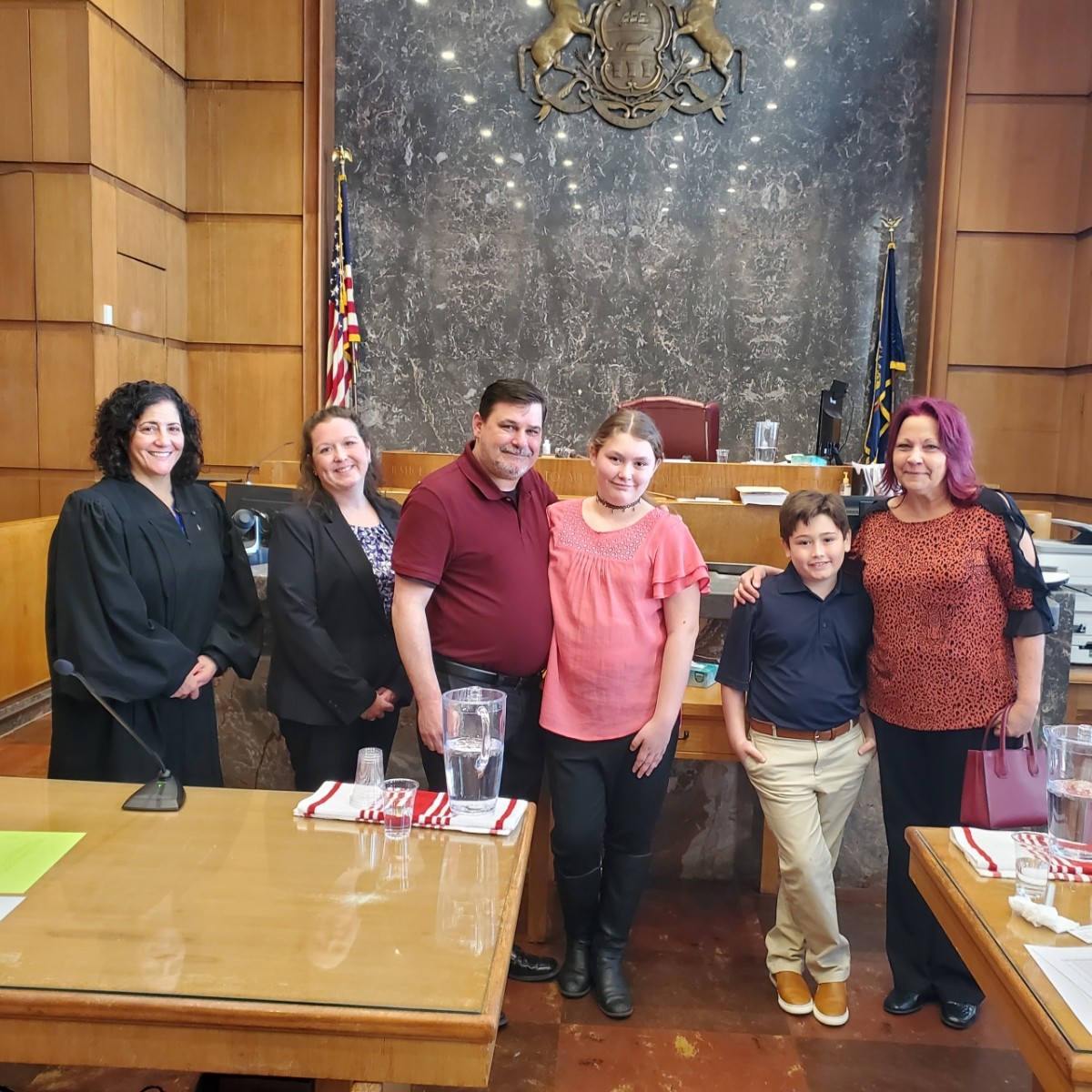
Hands-on Advocacy: Central Pennsylvania Law Clinic helps families find stability and students find purpose
When Harrisburg grandmother Deborah Myers wanted to adopt her two young grandchildren, she turned to the Central Pennsylvania Law Clinic at Widener University Commonwealth Law School.
Through the clinic, Myers received free legal help that guided her through each step of the adoption process. It was support, she said, that changed everything.
“There are just not enough words to express the gratitude that we have to the Department of Aging and Widener Law Commonwealth,” Myers said during a recent press event. “They took the ball, went to court, and we got adoption. We appreciate your support.”
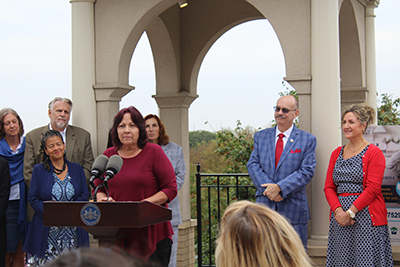 For Erin McCabe Lysaght, a 2023 graduate who represented Myers as a certified legal intern, the case was her first real taste of what it means to be a lawyer.
For Erin McCabe Lysaght, a 2023 graduate who represented Myers as a certified legal intern, the case was her first real taste of what it means to be a lawyer.
“I think the biggest thing that stood out to me with Ms. Myers’ adoption case was figuring out what needed to be done, where, and in what order,” Lysaght said. “Without access to affordable legal help, the adoption process can be overwhelming. Being part of this experience showed me how powerful it is to make the law work for people.”
Overseeing the case was Associate Clinical Professor Mary Catherine Scott, who directs the Central Pennsylvania Law Clinic. She’s spent years guiding students as they take on real clients and real cases involving families, housing, and older adults in need.
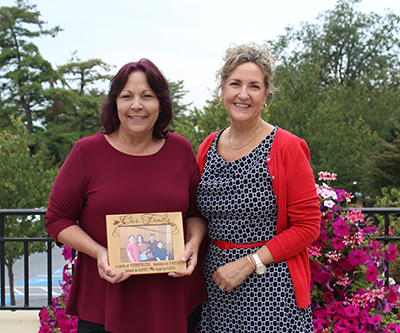 “We don’t handle adoptions all that often, so it required a lot of preparation and research,” Scott said. “Erin did a wonderful job staying focused and organized. Cases like this teach students that empathy and people skills matter as much as knowing the law. They see right away that the work they’re doing has a direct impact on someone’s life.”
“We don’t handle adoptions all that often, so it required a lot of preparation and research,” Scott said. “Erin did a wonderful job staying focused and organized. Cases like this teach students that empathy and people skills matter as much as knowing the law. They see right away that the work they’re doing has a direct impact on someone’s life.”
Scott watched Lysaght grow in confidence as the case moved forward. She helped her student draft documents, meet with Myers, and prepare for court.
“My role is to supervise and step in when needed, but the student really leads the case,” Scott said. “Erin did all the groundwork and presented the case before Dauphin County Judge Deb Curcillo, who made the day special for the family. Erin’s professionalism helped everything go smoothly.”
For Lysaght, the moment in court was unforgettable.
“My time at the clinic confirmed that I want to keep helping people who need access to lawyers,” she said. “To me, being a lawyer means being a bridge for people. I love helping them navigate situations that can feel impossible on their own.”
That experience, she added, shaped her career path.
"My work at the clinic absolutely was a driving force in my decision to become a public defender, a job that I absolutely love doing,” she said. “I’ve been with the York Public Defender’s Office for a year now, and every day reminds me why I chose this work.”
Scott said the clinic is designed to give students those kinds of experiences—where lessons about professionalism, empathy, and problem-solving come to life.
“One of the first things we tell students is that we’re not here to judge, we’re here to help,” she said. “Our clients come to us for guidance, and students learn how to represent them with compassion and respect. It’s an experience that sticks with them long after graduation.”
By the end of each semester, she said, that transformation is easy to see.
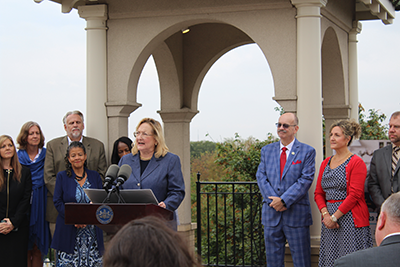 “Students arrive nervous about meeting clients or speaking in court,” Scott said. “By the time they leave, they’ve found their confidence. They can draft documents, interview clients, and handle hearings. The clinic gives them the chance to step into the role of an attorney before they graduate.”
“Students arrive nervous about meeting clients or speaking in court,” Scott said. “By the time they leave, they’ve found their confidence. They can draft documents, interview clients, and handle hearings. The clinic gives them the chance to step into the role of an attorney before they graduate.”
Each case, she added, reminds students that law is about people, not paperwork.
“All of our clients are grateful, and students see the difference they’ve made,” Scott said. “Whether it’s an adoption, a custody case, or helping someone set up a power of attorney, they realize they’ve helped someone move forward in life.”
That same commitment to service continues through the Pennsylvania Grandparents Raising Grandchildren Legal Line, a statewide program launched by the SeniorLAW Center, the Department of Aging, and the Pennsylvania Supreme Court’s Elder Justice Initiative. The hotline connects grandparents who are raising grandchildren with free legal help and resources.
Scott said the clinic’s long partnership with the Department of Aging ties directly into that effort.“We’ve worked on grandparent custody cases for years through our contract with the Department of Aging,” she said. “The hotline highlights how important this work is and reinforces that Widener Law Commonwealth is part of a broader effort to support families.”
Lysaght said programs like the hotline reflect the kind of community-focused education she experienced at Widener Law Commonwealth.
“They give students and new attorneys opportunities to work with real clients on real issues,” she said. “That’s exactly what I found through the clinic. It made everything I learned in the classroom feel meaningful and connected.”
The Central Pennsylvania Law Clinic embodies the heart of Widener Law Commonwealth’s mission to provide legal education that’s personal, practical, and professional. Students gain courtroom experience, build confidence, and help neighbors find justice in ways that textbooks alone can’t teach.
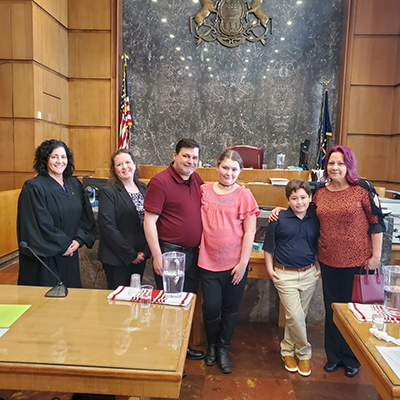
“The clinic reminded me that the law isn’t abstract,” Lysaght said. “It’s about people. Every document you draft, every hearing you prepare for, and every client you meet has a story that deserves to be heard. That’s what makes this work so meaningful.”
Scott agreed, saying the clinic’s greatest success is watching students discover their purpose.
“Our students don’t just learn the law,” she said. “They experience its ability to change lives. They leave here ready to serve their communities with confidence, compassion, and a real understanding of what it means to be an advocate.”
